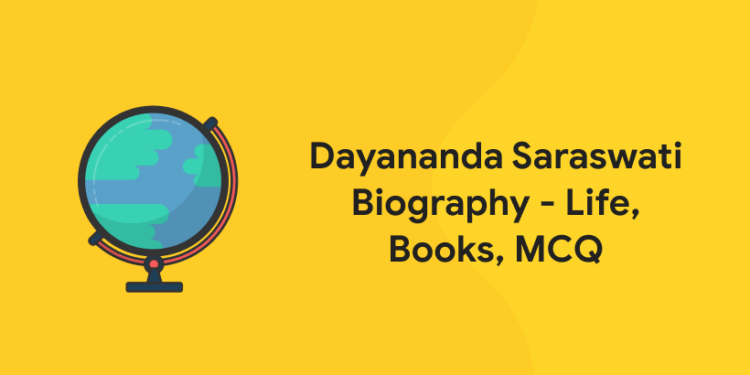Table of Contents
The Indian religious leader Swami Dayanand Saraswati was an Indian philosopher, social leader and founder of the Arya Samaj, a reform movement of the Vedic dharma and epitomized the aggressive Hindu religion. He was the first to give the call for Swaraj as “India for Indians” in 1876, a call later taken up by Lokmanya Tilak. He was born on February 12, 1824 in Tankara, Gujarat. His original name was Mul Shankar Tiwari because he was born in Dhanu Rashi and Mool Nakshatra.
This article gives you a glimpse of life history, Books written, MCQs for practicing and other important facts of the well known physicist and Mathematician Dayananda Saraswati. Going through this article will be very useful to crack GK parts for the candidates who are preparing for various competitive exams.
| Dayananda Saraswati | |
| Born | February 12, 1824 |
| Died | October 30, 1883 |
| Birth Place | Tankara, Gujarat |
| Place of death | Ajmer, Rajasthan |
| Father | Karshanji Lalji Tiwari |
| Mother | Yashodabai |
| Education | Self-taught |
| Religious Views | Hinduism |
| Movement | Arya Samaj, Shuddhi Movement, Back to the Vedas |
| Founder of | Arya Samaj |
| Publications | Satyarth Prakash (1875 & 1884);
Sanskar Vidhi (1877 & 1884); Yajur Veda Bhashyam (1878 to 1889) |
Attempt free GK mock tests! Download Entri App!
Dayananda Saraswati – Life
Swami Dayananda Saraswati was the founder of Arya Samaj. He was a social reformer and a great Hindu religious preacher.
He was raised in the orthodox Hindu tradition but soon found himself unsatisfied with the archaic teachings and practices, especially idol worship and other primitivism imposed on him.
At the age of 19 he left his family and undertook a long period of rigorous, ascetic study of the ancient Vedas—the oldest core of the Hindu religion.
Dayananda Saraswati formed Arya Samaj in 1875 A.D. He formed this ‘Samaj’ for the resurgence of Hindu society. He was born in a Brahmin family of Gujrat. He was a Sanskrit pundit. He did not know English. He came in contact with Keshab Sen after being Saint. After that he appointed himself during his last 8 years of life in reform work of religion and society.
Early Life and Education
Dayanand Saraswati was born on 12th February, 1824 into a wealthy Brahmin family in Gujarat, a part of western India somewhat isolated from British colonial influence. His father was Karshanji Lalji Trivedi and his mother was Yashodabai. His affluent and influential Brahmin family was an ardent follower of Lord Shiva. The family being deeply religious, Mool Shankar was taught religious rituals, piety and purity, and the importance of fasting from a very early age.
He believed that Hinduism had been corrupted by divergence from the founding principles of the Vedas and that Hindus had been misled by the priesthood for the priests’ self-aggrandizement. For this mission, he founded the Arya Samaj, enunciating the Ten Universal Principles as a code for Universalism, called Krinvanto Vishwaryam. With these principles, he intended the whole world to be an abode for Aryas (Nobles).
His next step was to reform Hinduism with a new dedication to God. He travelled the country challenging religious scholars and priests to discussions, winning repeatedly through the strength of his arguments and knowledge of Sanskrit and Vedas. Hindu priests discouraged the laity from reading Vedic scriptures, and encouraged rituals, such as bathing in the Ganges River and feeding of priests on anniversaries, which Dayananda pronounced as superstitions or self-serving practices. By exhorting the nation to reject such superstitious notions, his aim was to educate the nation to return to the teachings of the Vedas, and to follow the Vedic way of life. He also exhorted Hindus to accept social reforms, including the importance of cows for national prosperity as well as the adoption of Hindi as the national language for national integration
Dayanand Saraswati & Arya Samaj
On 7 April, 1875 Dayanand Saraswati formed the Arya Samaj at Bombay. It was a Hindu reforms movement, meaning “society of the nobles”. The purpose of the Samaj was to move the Hindu religion away from the fictitious beliefs. ‘Krinvan to Vishvam Aryam” was the motto of the Samaj, which means, “Make this world noble”. Outlined below are the 10 founding principles of the Arya Samaj was the pillar on which Maharishi Dayanand sought to reform India and asked people to go back to the Vedas and its undiluted spiritual teaching,
- God is the efficient cause of all true knowledge and all that is known through knowledge.
- God is existent, intelligent and blissful. He is formless, omniscient, just, merciful, unborn, endless, unchangeable, beginning-less, unequalled, the support of all, the master of all, omnipresent, immanent, un-aging, immortal, fearless, eternal and holy, and the maker of all. He alone is worthy of being worshiped.
- The Vedas are the scriptures of all true knowledge. It is the paramount duty of all Aryas to read, teach, and recite them and to hear them being read.
- One should always be ready to accept truth and to renounce untruth.
- All acts should be performed in accordance with Dharma that is, after deliberating what is right and wrong.
- The prime object of the Arya Samaj is to do good to the world, that is, to promote physical, spiritual and social good of everyone.
- Our conduct towards all should be guided by love, righteousness and justice.
- We should dispel Avidya (ignorance) and promote Vidya (knowledge).
- No one should be content with promoting his/her good only; on the contrary, one should look for his/her good in promoting the good of all.
- One should regard oneself under restriction to follow the rules of society calculated to promote the wellbeing of all, while in following the rules of individual welfare all should be free.
Spiritual Beliefs
Maharishi Dayanand was a believer in Hinduism just as the Vedas have outlined, devoid of any corruption and embellishments. Preserving the purity of the faith was of utmost important to him. He strongly advocated the concepts of Dharma which he believed to be free from any partiality and as an embodiment of truthfulness. To him Adharma was anything that did not hold true, was not just or fair and was opposed to the teachings of the Vedas.
He believed in reverence of human life irrespective of anything and condoned the practice of Ahimsa or non-violence. He advised his countrymen to direct their energy towards betterment of mankind as a whole and not waste away in unnecessary rituals. He revoked the practice of idol worship and considered them a contamination introduced by the priesthood for their own benefit. He was against other social evils like superstitions and caste segregation. He advocated the concept of Swarajya, meaning a country free of foreign influence, resplendent in the glory of fair and just participants.
Shuddhi Movement
The Shuddhi Movement was introduced by Swami Dayanand to bring back the individuals to Hinduism who were either voluntarily or involuntarily converted to other religions like Islam or Christianity. Shuddhi or purification was imparted to those who sought their way back to Hinduism and the Samaj did an excellent work in penetrating the various strata of society, taking back the depressed classes into the folds of Hinduism.
Get Homi J Bhabha – Inventions, Contribution, Awards, Quotes
Dayananda Saraswati – Books
1: Who was the first woman President of India?
Here listed out some of the books written by Swami Dayanand Saraswati, an influential religious and social reformer and the founder of Arya Samaj.
- Satyarth Prakash
- The Teaching of the Bhagavad Gita
- Introduction to Vedanta
- The Value Of Values
- Vedic View and Way of Life
- Moments With Oneself/The Problem is You The Solution is You
- Moments With Oneself/Vedanta 24X7
- Discovering Love
- Morning Meditation Prayers
- Yoga of Objectivity
- Tattvabodha
- Moments With Oneself/Vedanta 24X7
- Gokarunanidhi ( Hindi Edition )
- Sri Rudram
- Stress Free Living
- Successful Living PUBLIC TALKS
- Freedom from Helplessness
- Action and Reaction
- Freedom in Relationship
- Need for Cognitive Change
- On Namo Bhagavate Vasudevaya
- Insights
- Crisis Management
- Living Versus Getting on: from a Survivor to a Contributor
- Teaching Tradition of Advaita Vedanta
- Surrender and Freedom
- Freedom
- Purpose of Prayer
- El Valor de los Valores
- Moments with Krishna
- Morning Meditation Prayers
- Yoga Of Objectivity
- Bhagavad Gita – Home Study Course (Set of 9 Volumes)
- Todo sobre Sadhana
Free UPSKILLING Courses!
Take your first step toward mastering in-demand skills, acing interviews, and securing top-tier jobs with Entri's free upskilling courses.
Start Learning!Dayananda Saraswati – MCQs
Q.1 Who inspired Dayananda Saraswati to devote his life to get Vedas its rightful place in Hinduism?
A. Virajanand Dandeesha
B. Ramakrishna Paramhansa
C. Maharaja of Jodhpur
D. His mother
Answer: [A] Virajanand Dandeesha also known as Birajananda
Q.2 What is the name of the book written by Maharshi Dayananda in 1875. The book is written in Hindi and has been translated in many other languages. In English the title is “The Light of Meaning of Truth”. .
Answer: Satyarth Prakash
Q.3 Which organization Dayananda Saraswati was persuaded to join but eventually he did not, though he found the principles of the organization very close to his own.
A. Hindu Maha Sabha
B. Congress
C. Prarthana Samaj
Q.4 Which of the following was NOT propounded by Dayananda Saraswati
A. Back to Vedas
B. Harijan
C. Swadeshi
D. Ahimsa
Answer:[D] Ahimsa
Q.5 Dayananda Saraswati was born on 12th Feb 1824 in Tankara, Kathiawad Gujrat. His original name was
A. Adi Shankar
B. Mool Shankar
C. Bhole Shankar
D. Rudra Shankar
Answer:[B] Mool Shankar
Q.6 On a fateful Diwali on 30 October 1883 Dayananda Saraswati passed away chanting mantras. What was the reason for his death?
A. Drowning
B. Dysentery
C. Poisoning
D. Bullock cart accident
Answer:[C] Poisoning
Q.7 Swami Dayananda had translated the __________ into Hind
A. Rig Veda and Yajur Veda
B. Four Veda
C. Sama Veda and Atharva Veda
D. Sama Veda and Yajur Veda
Answer:[A] Rig Veda and Yajur Veda
Q.8 Maharishi Dayanand Saraswati was an important Hindu religious scholar, reformer, and founder of the __________
A. Arya Samaj
B. Brahma Samaj
C. Ramakrishna Mission
D. Theosophical society
Answer:[A] Arya Samaj
Q.9 Swami Dayanand Saraswati showed courage in
A. Instigating people to fight against the British rule
B. Actively supporting the 1857 War of Independence
C. Delivering fiery speeches against the higher ups in the Society
D. Denouncing the social evils
Answer:[D] Denouncing the social evils
Q.10 Dayananda Saraswati fulfilled his movement by writing two books namely
A. Satyarth Prakash
B. Vedabhasya
C. Satyarth Prakash and Vedabhasya
D. Sanskar Vidhi
Answer:[C] Satyarth Prakash and Vedabhasya
Conclusion
He urged Indians to ‘Go back to the Vedas”. We have nothing to learn from the West. Because our Veda is self-sufficient in respect of all knowledge and teaching.
He was against the deity worship, child marriage and caste system and was a great supporter of women education, widow marriage and sea voyages.
He fulfilled his movement by writing two books namely ‘Satyarth Prakash’ and ‘Vedabhasya’.
Swami Dayananda Saraswati died in 1883 A.D. His followers tried to continue to propagate his ideologies. The important representatives of Arya Samaj were Lal Hamsaraj, Pandit Guru Datta, Lala Lajpat Rai and Swami Shraddhananda. Lala Hansraj founded ‘Anglo Vedic College’ in Lahore. Shraddhanand founded ‘Gurudal Arya Vidyalaya’ in Haridwar in 1902 A.D. Their main object was to propagate the ideology of Veda.
Attempt free GK mock tests! Download Entri App!
Download Entri App, Entri provides you effective learnings in a period of time with the help of expert teams and you can accomplish the goal with the Entri App. Start your preparation for your dream government job with Entri App. We provide a wide range of courses over different government exams. We are providing you the best platform for the preparations for every prestigious exam. Here you can get access to a number of mock tests and get daily practice GK and Current affairs questions.













